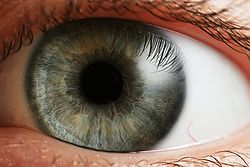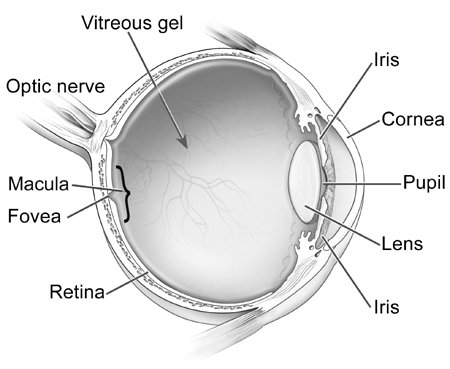Why I Dilate Your Pupils For an Eye Exam

Dilating your pupils is necessary for me to give you a comprehensive eye exam and (hopefully) a clean bill of health. Besides measuring your vision acuity (i.e., how well you see), it is very important that I examine the physiology of your eyes. After inspecting the iris, cornea, and other tissue on the exterior of the eye, I need to take a look inside. The pupil is the window into the internal structure of the eye. Since the light I use to peer inside your eye causes the pupil to contract naturally, I use drops which dilate the pupil, giving me a better view of the tissue inside.
What I am looking for
Through the dilated pupil, I can get a good look at the retina, optic nerve, and the array of blood vessels inside your eye. I examine the physical health of the retina and look for any abnormalities that may indicate problems such as diabetic retinopathy, macular degeneration, and detached retina. I also inspect the optic nerve for damage associated with glaucoma and check for symptoms of various general health problems like hypertension, high blood pressure, high cholesterol, and infectious disease.

After the exam
The drops used to dilate your pupils usually take about 30 minutes to take effect and, depending on the patient, about three hours to wear off. Since your eyes will be very sensitive to light, we send you home with special sunglasses (or you can bring your own quality pair with UV protection). Some patients experience blurred vision after dilation and may have difficulty reading fine print or focusing on objects. If you have experienced difficulty seeing after dilation, or do not know how your eyes are going to react, you should arrange for a ride home. You should also get a ride if you have a condition such as macular degeneration. If in doubt, ask your optometrist when scheduling your appointment.
Dr. Jeff Pinkerton
I care for you.
Comments are closed.

[…] what to expect: Diabetic patients will have their pupils dilated and/or they will undergo quick, painless retinal imaging to produce an optomap — an ultra-wide […]
[…] Regular Eye Exams Can Prevent Vision Loss Caused by Glaucoma Posted in Eye Care, Services | Leave a comment Tweet January is National Glaucoma Awareness Month. Glaucoma is the leading cause of preventable blindness and affects more than 2.2 million Americans. The disease often has no symptoms and goes unnoticed until permanent vision loss occurs. The only way to catch the disease before irreversible damage occurs to the optic nerve is through periodic dilated eye exams. […]
[…] Schedule a Comprehensive Dilated Eye Exam […]